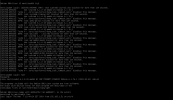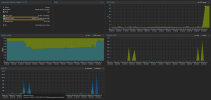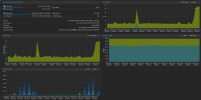Something seems to be not quite right with this patch.
In our cluster everything was fine until the installation of pve-qemu-kvm 8.1.5-2
Since the update last friday we have a VM experiencing high iowait (~60%) during backup (no freeze/crash luckily).
After backup completes, the iowait returns to normal (~4%).
The said vm uses an hdd disk on a ceph pool with iothreads.
I disabled iothreads now and will observe the behaviour at the next backup cycle
In our cluster everything was fine until the installation of pve-qemu-kvm 8.1.5-2
Since the update last friday we have a VM experiencing high iowait (~60%) during backup (no freeze/crash luckily).
After backup completes, the iowait returns to normal (~4%).
The said vm uses an hdd disk on a ceph pool with iothreads.
I disabled iothreads now and will observe the behaviour at the next backup cycle





